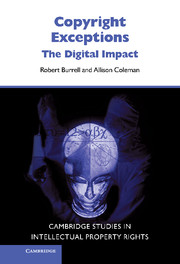Book contents
- Frontmatter
- Contents
- Preface
- List of abbreviations
- Table of cases
- Table of statutes
- Introduction
- Part I Where we are
- 1 Copyright and freedom of expression
- 2 Fair dealing for the purposes of criticism, review and news reporting and related exceptions
- 3 The public interest defence
- 4 Exceptions applying to education, research and private study
- 5 The library and archive provisions and related exceptions
- Part II How we got here
- Part III Where we go from here
- Appendices
- Copyright, Designs and Patents Act 1988, Part I, Chapter III: ‘Permitted Acts’
- Copyright, Designs and Patents Act 1988, s. 296ZE and Schedule 5A
- Directive 2001/29/EC of the European Parliament and of the Council of 22 May 2001 on the harmonisation of certain aspects of copyright and related rights in the information society
- United States Copyright Act 1976, 17 USC, s. 107
- Bibliography
- Index
- Cambridge Studies in Intellectual Property
4 - Exceptions applying to education, research and private study
Published online by Cambridge University Press: 04 March 2010
- Frontmatter
- Contents
- Preface
- List of abbreviations
- Table of cases
- Table of statutes
- Introduction
- Part I Where we are
- 1 Copyright and freedom of expression
- 2 Fair dealing for the purposes of criticism, review and news reporting and related exceptions
- 3 The public interest defence
- 4 Exceptions applying to education, research and private study
- 5 The library and archive provisions and related exceptions
- Part II How we got here
- Part III Where we go from here
- Appendices
- Copyright, Designs and Patents Act 1988, Part I, Chapter III: ‘Permitted Acts’
- Copyright, Designs and Patents Act 1988, s. 296ZE and Schedule 5A
- Directive 2001/29/EC of the European Parliament and of the Council of 22 May 2001 on the harmonisation of certain aspects of copyright and related rights in the information society
- United States Copyright Act 1976, 17 USC, s. 107
- Bibliography
- Index
- Cambridge Studies in Intellectual Property
Summary
In this chapter and the next we focus on the exceptions that apply to institutional users of copyright such as schools, universities, libraries, archives, museums and galleries. Our principal focus in this chapter is on the exceptions that apply to educational establishments, but we also consider as a preliminary matter the fair dealing exception that allows use of a work for the purposes of research or private study.
The impact of copyright law on educational establishments has become highly controversial over recent years. On the one side, copyright owners have become more militant, concerned to protect their rights in the face of what they see as blatant and widespread unauthorised copying, and motivated by technological advances which they believe may drive them out of business. Publishers have also long emphasised that the works that are most frequently copied in educational establishments are works made for the educational market and consequently that broad educational copying exceptions would result in a decrease in the supply of those works that educational establishments find most useful. On the other side, educational establishments want to be able take advantage of the ease with which copies of works can now be made and have to respond to the changing expectations of students and to government pressure to take advantage of new technologies. Moreover, in higher education in particular, class sizes have grown considerably since the 1980s, with classes containing hundreds of students now the norm.
Information
- Type
- Chapter
- Information
- Copyright ExceptionsThe Digital Impact, pp. 113 - 135Publisher: Cambridge University PressPrint publication year: 2005
